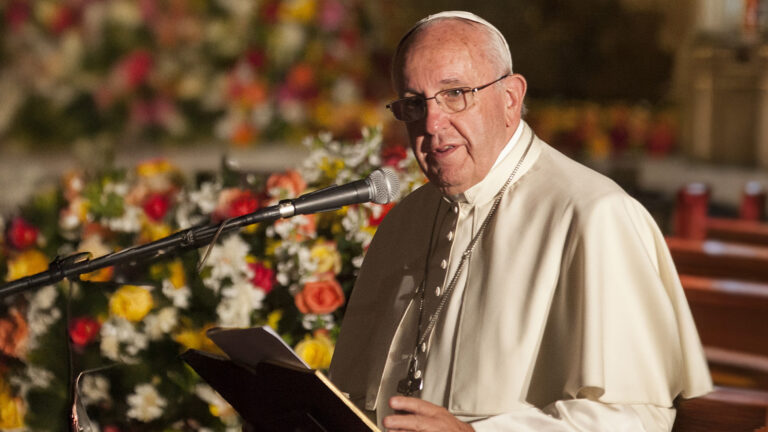Our theology of God doesn’t only inform our understanding but our relationship with him. As I’ve been arguing in this series of articles, our conception of God shapes and colours everything, all of life. Most traditional African religions believe that there is one God, but also that he is remote and uninterested in us. God’s self-revelation in the Bible doesn’t only introduce us to a very different God, but also one who has existed eternally as three persons: the Father, the Son, and the Spirit. Fundamentally, then, his nature is radically unlike most beliefs about God across our continent. In this article we’re going to explore the significance of God’s eternal being as three persons for how we relate to him.
Most traditional African religions believe that there is one God, but that he is uninterested in us.
Contrast with most traditional African religions and worldviews, God has a trinitarian nature. As I’ve already said, this is critical both for a true knowledge of him as well as being able to properly relate to him. The focus on this article will be the language of us having a father-child relationship with God. Both Christianity and ATRs consider people to be children of God. But how that happens according to the religious systems is markedly different. This will be my contention below.
The Father-Child relationship With God in ATR
John Mbiti speaks about the father-child relationship that Africans enjoy with God. He writes, “A number of African people look upon God as Father and themselves as his children. This image gives the idea of a family…It implies that God has not only ‘begotten’ or made the people, but [is] also their protector, provider, and keeper.” Therefore, most Africans believe they have this kind of relationship with God. They consider him a Father; or, in Mbiti’s words, they “look upon God as Father and themselves as his children.” The difficulty is that it isn’t clear if that’s how God sees himself; if that’s who God truly is. Contrast with that, in the Bible God declares that he is our Father and calls us his children (2 Corinthians 6:18).
The difference has to do with revelation, the source of our theology.
The difference isn’t merely semantics. No, it has to do with revelation, the source of our theology. Where do we gain knowledge about God? Mbiti’s language suggests a bottom-up revelation, rather than top-down. Put another way, Mbiti says we call God ‘Father’ because that’s how many Africans perceive him. Our ideas about God inform who we think he is. Christian theology is very different. It doesn’t ask: what do the people think God is like? Rather the question is always: what has God made known to us about himself? The contrast between those two approaches is profound. For the first looks at the world and then wonders who God is; in the second God reveals himself to those he’s made.
The Christian’s Relationship to God in Christ
Christians would agree with Mbiti, to a point. God is our Father. After all, Adam is “God’s son” (Luke 3:38); Jesus taught us to pray to “our Father” (Mathew 6:9). However, Adam is the only human in scripture specifically called a child of God, based on the fact that God created him. Jesus, the second Adam, is the only human born a child of God (Luke 1:31-23). The rest of humankind become God’s children through the covenant relationship he establishes with them. No one is born a child of God. God has to act in history in a special way to make us his children. Again, there’s an important difference here. The father-child relationship Christians enjoy with God isn’t assumed; it’s enacted by God.
We become God’s children through the covenant relationship he establishes with us.
This action on God’s part was always his plan, determined before the creation of the world. “In love, God predestined us for adoption to himself as sons through Christ, according to his will” (Ephesians 1:4-5). Note here also that the work of God is trinitarian. The Father determines to adopt people as his sons and daughters, in his Son or “through Christ.” To accomplish his purpose of adoption, each person of Trinity would play a specific role.
Hear how that passage continues. Speaking about Jesus, Paul writes, “In him we have redemption through his blood, the forgiveness of our trespasses, according to the riches of his grace” (Ephesians 1:7). Christ’s redemptive work on the cross is the means by which God accomplishes our adoption into his family. Just like in our earthly institutions, adoption demands a high cost on the adopting party; so it is with our being adopted into God’s family. This is Jesus’ role, he is the price that God pays to make us his children. That is why those who believe in him are given the right to be called children of God (John 1:12).
The Role of the Holy Spirit
Finally, Paul concludes that section saying that “the Holy Spirit” in us is “the guarantee of our inheritance” (Ephesians 1:13). That is, God gave us his Spirit to assure us that we are his children, rightful heirs with his Son, Jesus Christ (Romans 8:14-17). In other words, to provide us with a guarantee of our adoption through Jesus Christ, God gave us his Spirit through whom we can cry ‘Abba, Father.’ The only way humans can have an assured father-child relationship with God is through the work of each person of the Trinity playing specific roles. We cannot assume this. No, we must entrust ourselves to the gracious action of God.














